|
|
|
Sort Order |
|
|
|
Items / Page
|
|
|
|
|
|
|
| Srl | Item |
| 1 |
ID:
124969


|
|
|
|
|
| Publication |
2013.
|
| Summary/Abstract |
The article explores the potential of local civil associations for the study of power relations within Palestinian society during the Mandate. It argues that civil associations substituted political institutions and procedures serving functions that, in a sovereign state, would have been fulfilled by governmental authorities. Civil society organizations enabled democratic elections, mobilizing popular support and the establishment of hegemonic structures. The discussion begins with a survey of organizations that may have inspired Palestinian civil associations, and then considers the rise of mass politics in Ottoman provinces and its consequences for civil associations. By examining two Arab civil associations established in Haifa during the British Mandate, the article shows how this framework served the political aspirations of individuals and groups from various social strata.
|
|
|
|
|
|
|
|
|
|
|
|
|
|
|
|
| 2 |
ID:
124962
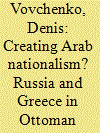

|
|
|
|
|
| Publication |
2013.
|
| Summary/Abstract |
The article discusses Russian and Greek rivalry over the influence in the Patriarchates of Jerusalem and Antioch from the end of the Egyptian occupation to the Young Turk Revolution. While Greece ultimately aimed at including Orthodox Arabs in a Pan-Hellenic nation, Russian private and state actors were motivated by the cultural and political commitment to the defence of Orthodoxy from western inroads. Throughout this period, Russian diplomats were able to continue their traditional partnership with many Ottoman Greek prelates even after the Bulgarian schism of 1872. But when their leadership seemed to be the cause of mass defections from orthodoxy, Russian foreign policy makers from local consuls to the tsar were drawn into supporting the restoration of native Arab control. The article brings fresh archival evidence to put into context the development of some of the earliest modern Arab autonomous institutions. It also contributes to the discussion of the strength of dynastic and religious identities before 1914.
|
|
|
|
|
|
|
|
|
|
|
|
|
|
|
|
| 3 |
ID:
124961


|
|
|
|
|
| Publication |
2013.
|
| Summary/Abstract |
The centralization-decentralization controversy has been considered the key to understanding Second Ottoman constitutional politics. The Committee of Union and Progress (CUP) is considered to be centralist, while the opposition is regarded as decentralist under the intellectual influence of Prens Sabahattin with the support of non-Turkish ethnic groups. In actuality, both the CUP and the opposition emphasized the need for administrative decentralization (or the delegation of authority) while they rejected political decentralization, considering it as a first step toward the dismemberment of the Empire. Non-Turkish politicians shared this general state of mind as well. Therefore, the political bipolarization and its causes during this period needs to be reconsidered from a different viewpoint.
|
|
|
|
|
|
|
|
|
|
|
|
|
|
|
|
| 4 |
ID:
124960
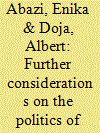

|
|
|
|
|
| Publication |
2013.
|
| Summary/Abstract |
In the standard tradition of both Albanian studies and Western scholarship, including either any interested religious and political activism or less 'interested' lay people, endeavours of historical and textual fact-finding have been relevant only to re-confirm and indeed perpetuate the very meaning of a myth, according to which the thinking of Naim Frashëri was formed and dominated by Bektashism and his 'Albanianism' had a Bektashi foundation. In an earlier paper this myth was shown to be unreliable by arguing that Frashëri's religious thinking was shaped by religious dualism. This paper argues further that Naim Frashëri went far beyond Bektashism in his heterodoxy, not only in a kind of liberation theology, but also by embracing a comprehensive pantheism which generated an active and all-inclusive attitude to Albanian identity, not necessarily limited in any special way to Bektashism. Methodologically, such a new picture must arise if the analysis of the historical and literary contextualization of Frashëri's major works is submitted to the perspective of social theoretical approaches to religion developed in sociology and anthropology.
|
|
|
|
|
|
|
|
|
|
|
|
|
|
|
|
| 5 |
ID:
124970
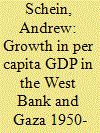

|
|
|
|
|
| Publication |
2013.
|
| Summary/Abstract |
This paper examines the growth of per capita GDP in the West Bank and Gaza Strip (WBG) from 1950 to 2005. Data from Israel's Central Bureau of Statistics and the World Bank is integrated with Angus Maddison's estimates of per capita GDP of the WBG and Israel to produce new estimates of per capita GDP for the WBG from 1950-2005 in 1990 international dollars. With these new estimates, it is possible to compare the growth in WBG from an international perspective. One finding is that from 1968 to 1999 the economic growth in WBG was the tenth highest in the world.
|
|
|
|
|
|
|
|
|
|
|
|
|
|
|
|
| 6 |
ID:
124971
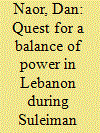

|
|
|
|
|
| Publication |
2013.
|
| Summary/Abstract |
This paper examines the changes in the balance of power in domestic and foreign arenas in Lebanon during the regime of President Suleiman Frangieh between the years of 1970 and 1976. Changes occurred in both arenas which influenced the stability of the regime and led the country to a civil war. In the domestic political arena, the regime ceased to rely on a Maronite-Sunni-Shiite axis and began to rely firstly on a Maronite-Shiite axis, and then on a Maronite-Druze axis. These steps aroused the Sunni establishment against the regime and led to instability. In the foreign arena, the regime exchanged their policy of neutrality on Arab and international arenas in favour of leaning towards 'revolutionary' Arab countries such as Syria, Iraq and Libya. This led to a rise in the influence and intervention of these Arab countries in Lebanese political affairs and escalated the turbulence on the streets of Lebanon against the Frangieh regime.
|
|
|
|
|
|
|
|
|
|
|
|
|
|
|
|
| 7 |
ID:
124965


|
|
|
|
|
| Publication |
2013.
|
| Summary/Abstract |
The Egyptian public has witnessed in recent decades an active, at times heated, debate between present and former left-wing activists and a variety of Egyptian intellectuals over the role played by Jews in the communist movements. The polemic discourse particularly focused on their contribution to the failure of the various communist organizations to unite, expand and take root within the Egyptian lower classes in the first half of the twentieth century. This article scrutinizes and analyses, chronologically, the ongoing discourse as it came to be expressed in a number of important ideological venues. This lively polemic discourse sheds new light on the centrality of Jews in the development of organized communism during the monarchy period. It also adds an important dimension to the historiographic debate regarding the Jews of Egypt, generally, and their attitude towards Zionism and the State of Israel, particularly.
|
|
|
|
|
|
|
|
|
|
|
|
|
|
|
|
| 8 |
ID:
124966
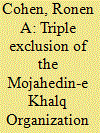

|
|
|
|
|
| Publication |
2013.
|
| Summary/Abstract |
While dealing with the human rights issue, the Mojahedin-e Khalq Organization (MKO), which used to be the main opposition group that fought the Islamic Republic of Iran (IRI), did not realize that this sensitive struggle would cost it a 'triple exclusion'. The MKO wished to use international agencies and diplomatic bodies, such as the European Union, the European Parliament, the UN and others, in order to raise the issue of human rights violations in Iran. In general, the aim was to topple the IRI by putting pressure on it through international sanctions and by gathering diplomatic support to replace the IRI with a democratic MKO government. The use of the human rights issue as a tool to gain support resulted in the opposite of what they wished. They became discriminated against by the IRI and excluded from the Iranian and international political spheres.
|
|
|
|
|
|
|
|
|
|
|
|
|
|
|
|
|
|
|
|
|